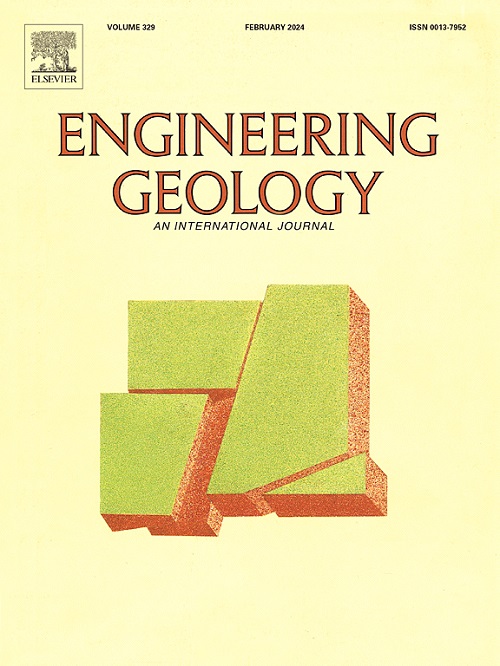Environmental effects and ESI-07 intensity of the Mw 7.7, September 19th, 2022, Michoacán, Mexico, earthquake
IF 6.9
1区 工程技术
Q1 ENGINEERING, GEOLOGICAL
引用次数: 0
Abstract
Most seismic risk assessments primarily focus on the impact of ground acceleration on infrastructure. However, in Mexico, along with numerous countries in Latin America and beyond, a significant portion of earthquake risk stems from secondary environmental effects such as tsunamis, landslides, and liquefaction processes. These secondary effects can often prove more lethal than the earthquake shaking itself. We used the Environmental Seismic Intensity scale (ESI-07) to assess the Earthquake Environmental Effects (EEEs) of the Mw 7.7 Michoacan earthquake on September 19th, 2022. This made it possible to comprehensively characterize the EEEs and their potential social consequences in the epicentral area along the Mexican subduction zone. Our study draws on data gathered from extensive field surveys, satellite imagery analysis, social media monitoring, and online resources, totalling data from over 8000 sites with EEEs. Through rigorous analysis, ESI-07 intensity values illuminate the vulnerability of coastal areas and coastal ranges to specific secondary effects triggered by large seismic events. We meticulously map the spatial distribution of these triggered EEEs, presenting A) an ESI-07 isoseismal map, and B) comparative analysis with other significant earthquakes, particularly subduction megathrust interface events. Our findings underscore the critical importance of considering environmental coseismic effects and using the ESI-07 scale in territorial planning and seismic risk preparedness. Furthermore, we highlight the unique characteristics of the Mexican Pacific coastal region and, more broadly, the distinct risks posed by coastal areas along subduction zones in terms of secondary seismic environmental hazards. This work emphasizes the urgent need to acknowledge the vulnerability of these regions to secondary effects and the imperative for resilience-building measures to safeguard human well-being and mitigate economic repercussions in the face of future seismic events.
2022 年 9 月 19 日墨西哥米却肯州 7.7 级地震的环境影响和 ESI-07 地震烈度
大多数地震风险评估主要关注地面加速度对基础设施的影响。然而,在墨西哥以及拉丁美洲和其他地区的许多国家,地震风险的很大一部分源于次生环境影响,如海啸、山体滑坡和液化过程。这些次生影响往往比地震本身更致命。我们使用环境地震烈度表 (ESI-07) 评估了 2022 年 9 月 19 日米却肯州 7.7 级地震的地震环境效应 (EEE)。这使得我们能够全面描述墨西哥俯冲带震中地区的地震环境影响及其潜在的社会后果。我们的研究利用了从广泛的实地调查、卫星图像分析、社交媒体监测和在线资源中收集的数据,这些数据来自 8000 多个有 EEEs 的地点。通过严格的分析,ESI-07 烈度值揭示了沿海地区和沿海山脉易受大型地震事件引发的特定次生效应影响的程度。我们细致地绘制了这些引发的 EEE 的空间分布图,展示了 A)ESI-07 等震图,以及 B)与其他重大地震,特别是俯冲大地壳界面事件的对比分析。我们的研究结果强调了在国土规划和地震风险防范中考虑环境共震效应和使用 ESI-07 等震级的极端重要性。此外,我们还强调了墨西哥太平洋沿岸地区的独特性,以及更广泛地说,俯冲带沿岸地区在次生地震环境危害方面的独特风险。这项工作强调,亟需认识到这些地区易受次生影响的脆弱性,必须采取抗灾能力建设措施,以保障人类福祉,减轻未来地震事件对经济的影响。
本文章由计算机程序翻译,如有差异,请以英文原文为准。
求助全文
约1分钟内获得全文
求助全文
来源期刊

Engineering Geology
地学-地球科学综合
CiteScore
13.70
自引率
12.20%
发文量
327
审稿时长
5.6 months
期刊介绍:
Engineering Geology, an international interdisciplinary journal, serves as a bridge between earth sciences and engineering, focusing on geological and geotechnical engineering. It welcomes studies with relevance to engineering, environmental concerns, and safety, catering to engineering geologists with backgrounds in geology or civil/mining engineering. Topics include applied geomorphology, structural geology, geophysics, geochemistry, environmental geology, hydrogeology, land use planning, natural hazards, remote sensing, soil and rock mechanics, and applied geotechnical engineering. The journal provides a platform for research at the intersection of geology and engineering disciplines.
 求助内容:
求助内容: 应助结果提醒方式:
应助结果提醒方式:


